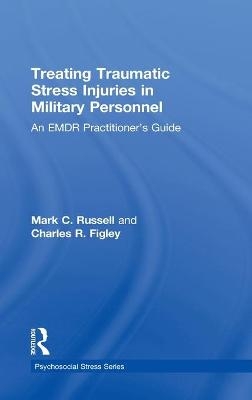
Treating Traumatic Stress Injuries in Military Personnel
Routledge (Verlag)
978-0-415-88977-3 (ISBN)
Russell and Figley introduce an array of treatment innovations designed especially for use with military populations, and readers will find pages filled with practical information, including appendices that feature a glossary of military terminology, breakdowns of rank and pay grades, and various clinical forms.
Mark C. Russell, PhD, is a retired U.S. Navy commander and board-certified clinical psychologist with 26 years of military experience. He is the author of multiple publications on war stress injuries and recipient of the 2006 Distinguished Psychologist Award by Washington State Psychological Association. Currently, he serves as chair of the PsyD program and founding director of the Institute of War Stress Injuries and Social Justice at Antioch University in Seattle. Charles R. Figley, PhD, is the Paul Henry Kurzweg Distinguished Chair in Disaster Mental Health at Tulane University. A former Marine sergeant who served early in the Vietnam War, he went on to help pioneer the modern study and treatment of trauma and many innovations in helping the traumatized, including practitioners themselves, in his more than 200 scholarly articles, chapters, and books.
Series Editor's Foreword. Foreword. Introduction. Part I: EMDR Treatment of Military Populations 1. Warriors, War, and Resilience 2. Overview of EMDR Therapy 3. Research on EMDR and War Stress Injury 4. Why Use EMDR Therapy in the Armed Services? Part II: The EMDR Protocol for Military Populations 5. Phase One: Client History, Rapport, and Treatment Planning 6. Phase Two: Client Preparation and Informed Consent 7. Phase Three: EMDR Assessment 8. Phase Four: Basic and Specialized Reprocessing Protocols 9. Phases Five-Six: Standard Reprocessing Protocols 10. EMDR Treatment for Acute War/Traumatic Stress Injury Part III: EMDR Treatment for Chronic War/Traumatic Stress Injury 11. EMDR Therapy of Pre-Military/Military-Trauma and Medically Unexplained Symptoms 12. EMDR Treatment of Traumatic Grief and Interpersonal Violence 13. Other Military Stress Injury and EMDR Treatment Considerations 14. Phases Seven-Eight: Closure and Re-evaluation Part IV: Special Considerations 15. Ethical and Medico-Legal Issues 16. Enhancing Resilience/Performance and Preventing Compassion Fatigue Appendix A: Military Mental Healthcare Referral Resources Appendix B: EMDR Reprocessing Troubleshooting Guide Appendix C: References
| Reihe/Serie | Psychosocial Stress Series |
|---|---|
| Zusatzinfo | 4 Tables, black and white |
| Verlagsort | London |
| Sprache | englisch |
| Maße | 152 x 229 mm |
| Gewicht | 566 g |
| Themenwelt | Geisteswissenschaften ► Psychologie |
| Medizin / Pharmazie ► Medizinische Fachgebiete ► Psychiatrie / Psychotherapie | |
| Sozialwissenschaften ► Soziologie | |
| ISBN-10 | 0-415-88977-4 / 0415889774 |
| ISBN-13 | 978-0-415-88977-3 / 9780415889773 |
| Zustand | Neuware |
| Haben Sie eine Frage zum Produkt? |
aus dem Bereich


